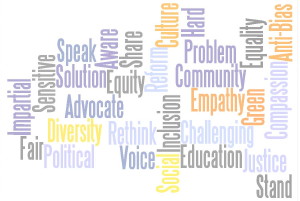| Welcome | About Me | Philosophy | Blog | Webquest |
| Podcasts | Books & Reading | Photos | Professional Projects | Digital Portfolio & Resume |
| Social Justice Faces: Take a Stand Against Hate! |
| Teacher Page |
A WebQuest for 4th-6th Grades Social Studies |
| Created By: Becky Tengs |
| beckytengs@pacificu.edu |
|
| Introduction | Learners | Standards | Process | Resources |
| Evaluation | Conclusion | Credits | Student Page |
| Introduction |
I was inspired to create this lesson after attending a conference on teaching for social justice & equity sponsored by Rethinking Schools. If advocacy and community involvement are concepts introduced to students at a young age, then they could be inspired to create change within their own communities. |
| Process | ||||||||||||||||||||
|
||||||||||||||||||||
| These social justice figures can also be researched with Wikipedia, Bio, Heroes, Meet Amazing Americans, or a general Google search. |
When completing your research, keep track of your sources in a word-processing document (i.e. which websites you use). You should use at least (3) different websites. |
| 3. Create a Wordle |
Based on your research, create a wordle including at least 15 words about the influencial advocate for social justice change. Be sure to include the name of your selected person in your Wordle How to create a Wordle Go to http://www.wordle.net Select "Create" Insert at least 15 adjectives, verbs, sentences, quotes, and organizations to describe the individual you researched Select "Randomize" to randomly change how your Wordle looks Use the Edit, Language, Font, Layout, and Color menus to change the appearance of your Wordle. Save to Gallery |
 |
| 4. Print Wordle -- saving Wordle is challenging because it is often difficult to re-locate the Wordle after it has been saved to the gallery. I would encourage students to print a pdf. version and a hard copy version. |
After creating and arranging your Wordle, print it. |
| 5. Write Letter to Inspirational Figure |
Write a letter to this individual describing how you could support their cause? If you are not interested in supporting their cause, explain why not. The letter should be about a hand written page. |
| 6. Share |
| After everyone has completed this project, students will be asked to share the product with classmates. |
| Conclusion |
After completing this lesson, students should have an idea and appreciation for what is means to work for social justice and how important figures have changed their world. This lesson should inspire students to consider how they can improve their communities. |
| Credits | |
|
